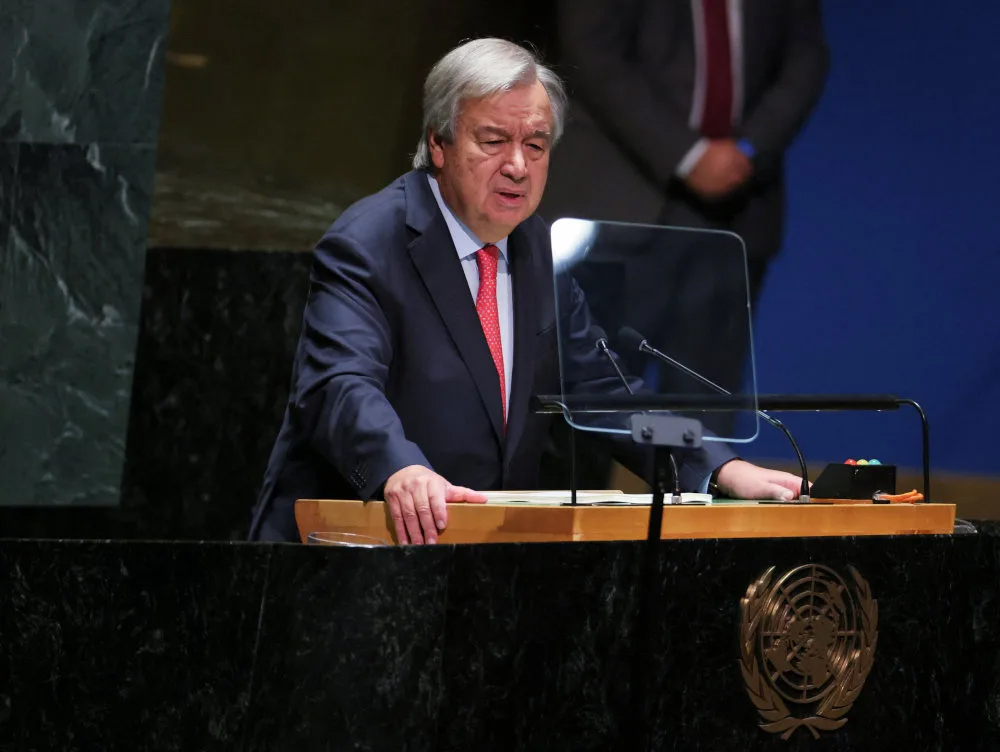UNITED NATIONS, (Reuters) – Countries addressing a climate summit during the U.N. General Assembly criticized big polluters for not doing more to tackle global warming, and the U.N. Secretary-General Antonio Guterres said time was running short thanks to the “naked greed” of fossil fuel interests.
With the two-week U.N. climate summit, COP28, due to start on Nov. 29 in Dubai in the United Arab Emirates, Guterres and leaders from climate-vulnerable nations implored policymakers around the world to phase out climate-warming fossil fuels.
“The move from fossil fuels to renewables is happening – but we are decades behind,” Guterres said at the start of the one-day summit. “We must make up time lost to foot-dragging, arm-twisting and the naked greed of entrenched interests raking in billions from fossil fuels.”
Guterres invited 34 countries to speak on Wednesday in recognition of their strong action on climate change, including Brazil, Canada, Pakistan, South Africa and the island nation of Tuvalu.
While some railed against the fossil fuel industry and countries’ continued reliance on oil, gas and coal, others highlighted the need to reform financial institutions to improve access to funding for developing nations.
From the Marshall Islands, a tropical South Pacific island nation facing land loss to rising seas, President David Kabua described his government’s struggle to prepare for a warmer world.
But “the boldest actions by my country alone are not enough,” he said. “Major emitters have failed to take these decisions, and so now we must prepare for relentless disaster.”
Those not invited to speak included the world’s two top polluters – the United States and China – though U.S. Special Envoy on Climate Change John Kerry was in the audience. China’s U.N. mission did not immediately respond to a request for comment.
The absence of both China and the United States and other major emitters on the stage was conspicuous, with some climate campaigners worrying it was a sign of slow progress ahead of COP28.
“In the two months or so until COP28, we must see a significant shift in political will,” said Manuel Pulgar-Vidal, who leads the global climate and energy campaign for the World Wildlife Fund.
Kenyan President William Ruto urged countries to create a universal tax on fossil fuel trades, levies on aviation and maritime emissions and financial transactions to raise trillions of dollars. “Neither Africa nor the developing world stands in need of charity” from developed countries, Ruto said.
California Governor Gavin Newsom spoke about his state’s leadership on climate policies, including a ban on the sale of new gas engine vehicles by 2035. He also called out the oil industry for obstructing climate action.
“This climate crisis is a fossil fuel crisis,” he said, drawing applause from heads of state and others in the room. “For decades and decades, the oil industry has been playing each and every one of us in this room for fools. They’ve been buying off politicians.”
Brazilian Environment Minister Marina Silva announced Brazil was raising its emission reduction target of 50-53% below 2005 levels by 2030, reflecting President Luiz Inacio Lula da Silva’s change of course from his predecessor, Jair Bolsonaro.
Thailand’s Prime Minister Srettha Thavisin said his country had raised its emission reduction target from 20% to 40% below business-as-usual projections by 2030, and also had created a climate change ministry.
While the UAE did not speak about its national climate plans, the UAE’s COP28 President Sultan Ahmed al-Jaber addressed the close of the summit with an optimistic message that the world is not “powerless” in trying to stay on track to meet the goal of limiting the rise in global temperature to 1.5 degrees Celsius.
“Let’s go after gigatons (of emissions), activate a truly global response to the global stocktake…and lets get back on track,” al-Jaber said, referring to the assessment countries will make of their climate goals against Paris climate targets at COP28.
With 70 days before COP28 begins, Barbados’s prime minister questioned this week’s focus at UNGA on the war in Ukraine.
“I hope that, in the same way that we can take Ukraine seriously in the Security Council, we can take the climate crisis and the financing for it seriously,” said Mia Mottley, who has called for a debt cancellation for low-income countries among other measures.
Climate change “is as much of a threat – in fact a greater threat because more lives are at stake globally than are at stake in Ukraine,” she added.
European Commission President Ursula von der Leyen said countries need to meet the long-unmet target of mobilizing $100 billion per year in climate finance.
“It is a question of trust,” she said, adding the EU would be sending $27 billion as it did last year.
Nepali Prime Minister Pushpa Kamal Dahal, representing the bloc of least developed countries, called for a doubling in finance for adapting to a climate-altered world, as this year is on track to be the warmest on record.
Kristalina Georgieva, managing director of the International Monetary Fund, called on countries to end fossil fuel subsidies, noting they had increased to a record $7 trillion last year despite a global pledge in 2021 to phase them out.
The U.N.’s Green Climate Fund for disbursing climate finance to developing countries also announced a goal of capitalizing at least $50 billion by 2030.
The fund will also shift its focus from supporting one-off projects to transforming whole systems, said the fund’s executive director, Mafalda Duarte.









